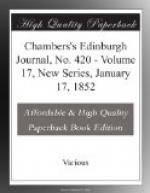At a short distance from Leyden may still be seen a flour-mill with a quaint old dwelling-house attached, which bears, on a brick in a corner of the wide chimney, the date 1550. Here, in 1606, was born Paul Rembrandt. At an early age he manifested a stubborn, independent will, which his father tried in vain to subdue. He caused his son to work in the mill, intending that he should succeed him in its management; but the boy shewed so decided a distaste for the employment, that his father resolved to make him a priest, and sent him to study at Leyden. Every one knows, however, that few lads of fifteen, endowed with great muscular vigour and abundance of animal spirits, will take naturally and without compulsion to the study of Latin grammar. Rembrandt certainly did not; and his obstinacy proving an overmatch for his teachers’ patience, he was sent back to the mill, when his father beat him so severely, that next morning he ran off to Leyden, without in the least knowing how he should live there. Fortunately he sought refuge in the house of an honest artist, Van Zwaanenberg, who was acquainted with his father.
‘Tell me, Paul,’ asked his friend, ’what do you mean to do with yourself, if you will not be either a priest or a miller? They are both honourable professions: one gives food to the soul, the other prepares it for the body.’
‘Very likely,’ replied the boy; ’but I don’t fancy either; for in order to be a priest, one must learn Latin; and to be a miller, one must bear to be beaten. How do you earn your bread?’
‘You know very well I am a painter.’
’Then I will be one too, Herr Zwaanenberg; and if you will go to-morrow and tell my father so, you will do me a great service.’
The good-natured artist willingly undertook the mission, and acquainted the old miller with his son’s resolution.
‘I want to know one thing,’ said Master Rembrandt; ’will he be able to gain a livelihood by painting?’
‘Certainly, and perhaps make a fortune.’
‘Then if you will teach him, I consent.’
Thus Paul became the pupil of Van Zwaanenberg, and made rapid progress in the elementary parts of his profession. Impatient to produce some finished work, he did not give himself time to acquire purity of style, but astonished his master by his precocious skill in grouping figures, and producing marvellous effects of light and shade. The first lessons which he took in perspective having wearied him, he thought of a shorter method, and invented perspective for himself.
One of his first rude sketches happened to fall into the hands of a citizen of Leyden who understood painting. Despite of its evident defects, the germs of rare talent which it evinced struck the burgomaster; and sending for the young artist, he offered to give him a recommendation to a celebrated painter living at Amsterdam, under whom he would have far more opportunity of improvement than with his present instructor.




